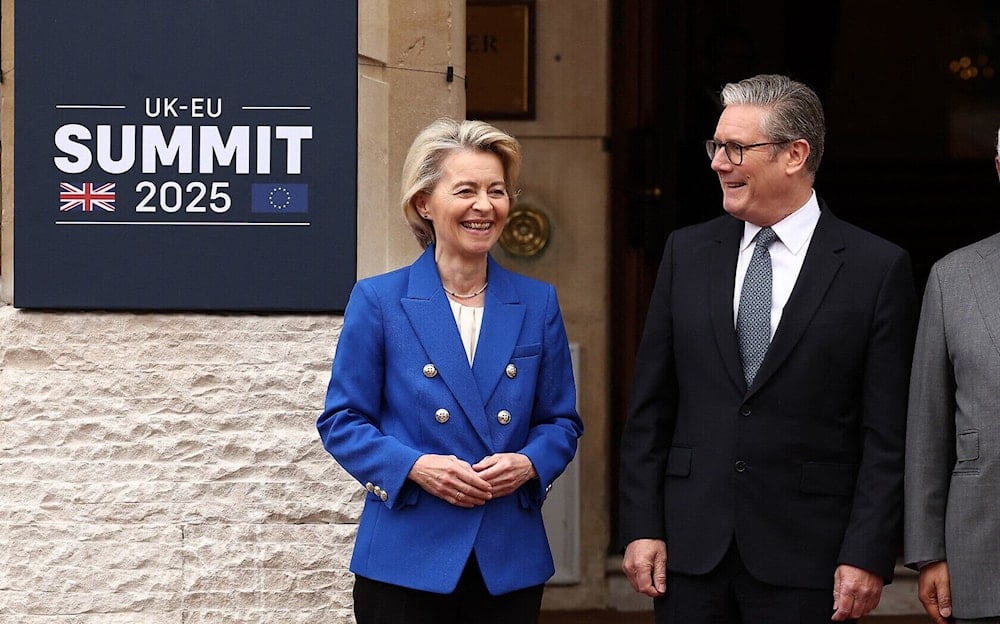UK, EU reset post-Brexit relations with defense and trade pact
The UK and EU sign a landmark post-Brexit deal to deepen defense ties and ease trade, marking a reset in relations amid rising geopolitical uncertainty.
-

Britain's Prime Minister Keir Starmer (right) poses with European Commission President Ursula von der Leyen at the UK-EU Summit at Lancaster House in London on May 19, 2025. (Pool/AFP)
The United Kingdom and the European Union reached a sweeping new agreement on Monday to strengthen defense cooperation, reduce trade friction, and formally reset relations five years after Brexit, launching what leaders called a “new era” of strategic partnership.
British Prime Minister Keir Starmer, who hosted the summit in London, described the accord as a chance to deliver “real, tangible benefits” for the UK, including lower energy costs, job creation, and enhanced border protection.
“We are agreeing a new strategic partnership fit for our times,” Starmer said.
The highlight of the deal is a newly signed Security and Defence Partnership, which paves the way for deeper coordination on foreign policy, intelligence sharing, and the potential for the UK to rejoin select EU military missions. The agreement may also allow Britain access to the EU’s planned €150 billion defense fund, though details remain to be finalized.
EU Commission President Ursula von der Leyen welcomed the outcome, calling it “a big day” for EU-UK relations.
“We are now turning the page and opening a new chapter… In these times of rising geopolitical tensions, we are like-minded. We share values,” she said.
Trade relief in exchange for fishing rights
On the economic front, the deal eases customs checks on British exports to the EU, particularly food and plant products, in exchange for the UK extending EU fishing rights in British waters until June 2038.
According to Downing Street, the trade provisions are expected to add nearly £9 billion ($12 billion) to the UK economy by 2040. The agreement means most cross-border shipments of animals and plant products will no longer require certification or inspections.
The agreement marks a sharp departure from the Conservative Party’s hardline Brexit posture, with Starmer’s Labour government seeking to repair strained EU ties without rejoining the customs union. Still, Starmer is walking a political tightrope, facing pushback from the right, including accusations from Conservatives that the deal amounts to a “surrender.”
Two other documents were also signed: a joint declaration of European solidarity and a Common Understanding outlining cooperation on youth mobility, trade, and migration. On youth mobility, negotiators have committed to developing a reciprocal scheme for 18- to 30-year-olds to work and study in each other’s countries, with details yet to be finalized.
The renewed UK-EU partnership arrives at a crucial moment for Europe, as fears grow over the security threat from Russia and a potential US withdrawal from NATO commitments under Donald Trump. While some aspects of the defense partnership remain vague, EU leaders view the deal as a first step toward more structured security coordination with London.
Starmer also reaffirmed his opposition to restoring full freedom of movement, but is open to limited arrangements, such as youth visas, amid domestic pressure over irregular migration and the rise of Nigel Farage’s far-right Reform UK party.

 3 Min Read
3 Min Read










